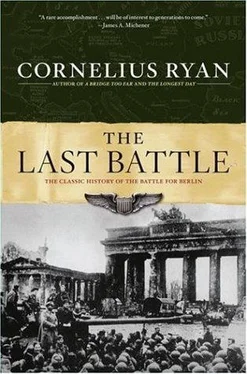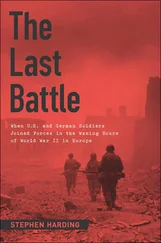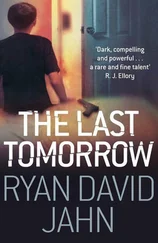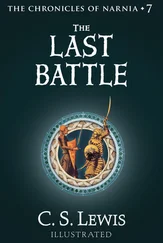Across the tormented city sirens began wailing the All Clear. The 314th Allied raid on Berlin was over. In the first years of the war the attacks had been sporadic, but now the capital was under almost continuous bombardment—the Americans bombed by day, the R.A.F. by night. The statistics of destruction had increased almost hourly; by now they were staggering. Explosives had laid waste more than ten square miles of built-up districts—ten times the area destroyed in London by the Luftwaffe. Three billion cubic feet of debris lay in the streets—enough rubble for a mountain more than a thousand feet high. Almost half of Berlin’s 1,562,000 dwellings had sustained some kind of damage, and every third house was either completely destroyed or uninhabitable. Casualties were so high that a true accounting would never be possible, but at least 52,000 were dead and twice that number seriously injured—five times the number killed and seriously injured in the bombing of London. Berlin had become a second Carthage—and the final agony was still to come.
In this wilderness of devastation it was remarkable that people could survive at all—but life went on with a kind of lunatic normality amid the ruins. Twelve thousand policemen were still on duty. Postmen delivered the mail; newspapers came out daily; telephone and telegraphic services continued. Garbage was collected. Some cinemas, theaters and even a part of the wrecked zoo were open. The Berlin Philharmonic was finishing its season. Department stores ran special sales. Food and bakery shops opened each morning, and laundries, dry-cleaning establishments and beauty salons did a brisk business. The underground and elevated railways functioned; the few fashionable bars and restaurants still intact drew capacity crowds. And on almost every street the strident calls of Berlin’s famous flower vendors echoed as in the days of peace.
Perhaps most remarkable, more than 65 per cent of Berlin’s great factories were in some kind of working condition. Almost 600,000 people had jobs—but getting to them now was a major problem. It often took hours. Traffic was clogged, there were detours, slowdowns and breakdowns. As a consequence, Berliners had taken to rising early. Everyone wanted to get to work on time because the Americans, early risers themselves, were often at work over the city by 9 A.M.
On this bright morning in the city’s sprawling twenty districts, Berliners came forth like neolithic cave dwellers. They emerged from the bowels of subways, from shelters beneath public buildings, from the cellars and basements of their shattered homes. Whatever their hopes or fears, whatever their loyalties or political beliefs, this much Berliners had in common: those who had survived another night were determined to live another day.
The same could be said for the nation itself. In this sixth year of World War II, Hitler’s Germany was fighting desperately for survival. The Reich that was to last a millennium had been invaded from west and east. The Anglo-American forces were sweeping down on the great river Rhine, had breached it at Remagen, and were racing for Berlin. They were only three hundred miles to the west. On the eastern banks of the Oder a far more urgent, and infinitely more fearful, threat had materialized. There stood the Russian armies, less than fifty miles away.
It was Wednesday, March 21, 1945—the first day of spring. On radios all over the city this morning, Berliners heard the latest hit tune: “This Will Be a Spring Without End.”
 2
2 
TO THE DANGERS that threatened them, Berliners reacted each in his own way. Some stubbornly disregarded the peril, hoping it would go away. Some courted it. Others reacted with anger or fear—and some, with the grim logic of those whose backs are to the wall, prepared bravely to meet their fate head on.
In the southwestern district of Zehlendorf, milkman Richard Poganowska was, as usual, up with the dawn. In years past his daily routine had often seemed monotonous. Now he was grateful for it. He worked for the 300-year-old Domäne Dahlem farm in Zehlendorf’s fashionable suburb of Dahlem, only a few miles from the center of the huge capital. In any other city the dairy’s location would have been considered an oddity, but not in Berlin. One fifth of the city’s total area lay in parks and woodlands, along lakes, canals and streams. Still, Poganowska, like many other Domäne employees, wished the farm were somewhere else—far outside the city, away from the danger and the constant bombing.
Poganowska, his wife Lisbeth and their three children had spent the night once again in the cellar of the main building on the Königin-Luise Strasse. Sleep had been almost impossible because of the hammering of anti-aircraft guns and the bursting of bombs. Like everyone else in Berlin, the big 39-year-old milkman was constantly tired these days.
He had no idea where bombs had dropped during the night, but he knew none had fallen near the Domäne’s big cow barns. The precious milk herd was safe. Nothing seemed to bother those two hundred cows. Amid the explosion of bombs and the thunder of anti-aircraft fire, they stood patiently, placidly chewing their cuds, and in some miraculous way they continued to produce milk. It never ceased to amaze Poganowska.
Sleepily, he loaded the ancient brown milk wagon and its trailer, hitched up his two horses, the fox-colored Lisa and Hans, and, with his gray spitz dog Poldi on the seat beside him, set out on his rounds. Rattling across the courtyard cobblestones he turned right on Pacelli Allee and headed north in the direction of Schmargendorf. It was 6 A.M. It would be nine at night before he finished.
Worn out, aching for sleep, Poganowska still had not lost his cheerfully gruff manner. He had become a kind of morale-builder for his 1,200 customers. His route lay on the fringes of three major districts: Zehlendorf, Schöneberg and Wilmersdorf. All three had been badly bombed; Schöneberg and Wilmersdorf, lying closest to the center of the city, were almost obliterated. In Wilmersdorf alone, more than 36,000 dwellings were destroyed, and almost half of the 340,000 people in the two districts had been left homeless. Under the circumstances, a cheerful face was a rare and welcome sight.
Even at this early hour, Poganowska found people waiting for him at each intersection. There were queues everywhere these days—for the butcher, the baker, even for water when the mains were hit. Despite the lines of customers, Poganowska rang a large cowbell, announcing his arrival. He had begun the practice early in the year when the increase in daylight raids made it impossible for him to deliver door-to-door. To his customers the bell, like Poganowska himself, had become something of a symbol.
This morning was no different. Poganowska greeted his customers and doled out their rationed quantities of milk and dairy products. He had been acquainted with some of these people for nearly a decade and they knew he could be counted on for a little extra now and then. By juggling the ration cards, Poganowska could usually produce a little more milk or cream for special occasions like christenings or weddings. To be sure, it was illegal and therefore risky—but all Berliners had to face risks these days.
More and more, Poganowska’s customers seemed tired, tense and preoccupied. Few people talked about the war any more. Nobody knew what was going on, and nobody could have done anything about it in any case. Besides, there were enough armchair generals. Poganowska did not invite discussions of the news. By submerging himself in his fifteen-hour daily routine and refusing to think about the war, he, like thousands of other Berliners, had almost immunized himself against it.
Читать дальше

 2
2 










